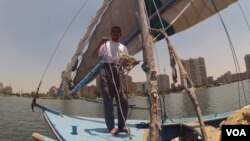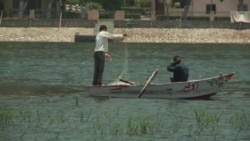CAIRO —
Egyptians are becoming increasingly concerned about Ethiopia's plans to build a massive dam that would mean less water in the Nile river for several years.
Cairo boat captain Adel Gamal ferries goods and people across the Nile. On a run from the banks of the nation's capital to a small island in the middle, he described what the waters mean to him. He called the Nile the source of life. But he, like many Egyptians recently, worry this life source is under threat.
Far upstream, on the main tributary, the Blue Nile, Ethiopia has begun diverting waters to build the massive Grand Renaissance dam. As the reservoir fills in the next few years, water levels downstream will drop.
Ethiopian officials say Egypt can make up the shortfall with better water management. They point out Cairo already gets the biggest share under what most Nile Basin countries say is an outdated treaty, made in 1959 when many of the countries were still under colonial rule.
As a largely desert country - in essence sand with a river running its length - Egypt argues it needs every drop. Veteran diplomat Ahmed Haggag, head of the Africa Society, said the other countries have alternatives to the Nile.
"They have a lot of rain. They don't know what to do with the rain. So the only country of the Nile Basin countries which really needs [Nile] water is Egypt," Haggag noted. "Without Egypt's Nile, there is no Egypt."
Critics say Egypt's current and former leaders failed to engage the upstream countries to protect national interests. Security specialist Sameh Seif el Yazal argued the best chance now is to take the issue to the United Nations.
"I would like it to be international, so everybody will be aware that Egypt will be harmed," el Yazal said. "And, it doesn't mean they have to stop building their dam. No. But the way is to sit together and say what can we do."
But, although the former intelligence officer suggests talks, some Egyptian politicians have spoken of sabotage. Politicians, unaware their comments were being broadcast live, suggested everything from stoking rebellion in Ethiopia to preparing military action against it.
El Yazal said such ideas only hurt Egypt.
"Ethiopia will use that if we go to the international law one day or go to the security council, whatever, they will use this against us, so please stop saying this," el Yazal said.
President Mohammed Morsi on Monday said Egypt is not calling for war, but added "all options are open." In what appears a rallying cry in a deeply divided country, Morsi said the lives of Egyptians are connected by the Nile as "one great people."
But General el Yazal warned that the president runs the risk of alienating his opponents further, if Egypt cannot advance its claims. Already, water shortages have hurt agriculture and periodic cut-offs are a bane to all.
Certainly, popular sentiment against the dam is running to the emotional, even religious.
Boatsman Mohammed Gamal also works the river in Cairo.
He said building the dam is haram -- forbidden by God. It is haram, he said, that they block the Nile and take the water.
Politics in Egypt may be polarizing, but the sanctity of the Nile seems the rare thing everyone agrees on.
Cairo boat captain Adel Gamal ferries goods and people across the Nile. On a run from the banks of the nation's capital to a small island in the middle, he described what the waters mean to him. He called the Nile the source of life. But he, like many Egyptians recently, worry this life source is under threat.
Far upstream, on the main tributary, the Blue Nile, Ethiopia has begun diverting waters to build the massive Grand Renaissance dam. As the reservoir fills in the next few years, water levels downstream will drop.
Ethiopian officials say Egypt can make up the shortfall with better water management. They point out Cairo already gets the biggest share under what most Nile Basin countries say is an outdated treaty, made in 1959 when many of the countries were still under colonial rule.
As a largely desert country - in essence sand with a river running its length - Egypt argues it needs every drop. Veteran diplomat Ahmed Haggag, head of the Africa Society, said the other countries have alternatives to the Nile.
"They have a lot of rain. They don't know what to do with the rain. So the only country of the Nile Basin countries which really needs [Nile] water is Egypt," Haggag noted. "Without Egypt's Nile, there is no Egypt."
Critics say Egypt's current and former leaders failed to engage the upstream countries to protect national interests. Security specialist Sameh Seif el Yazal argued the best chance now is to take the issue to the United Nations.
"I would like it to be international, so everybody will be aware that Egypt will be harmed," el Yazal said. "And, it doesn't mean they have to stop building their dam. No. But the way is to sit together and say what can we do."
But, although the former intelligence officer suggests talks, some Egyptian politicians have spoken of sabotage. Politicians, unaware their comments were being broadcast live, suggested everything from stoking rebellion in Ethiopia to preparing military action against it.
El Yazal said such ideas only hurt Egypt.
"Ethiopia will use that if we go to the international law one day or go to the security council, whatever, they will use this against us, so please stop saying this," el Yazal said.
President Mohammed Morsi on Monday said Egypt is not calling for war, but added "all options are open." In what appears a rallying cry in a deeply divided country, Morsi said the lives of Egyptians are connected by the Nile as "one great people."
But General el Yazal warned that the president runs the risk of alienating his opponents further, if Egypt cannot advance its claims. Already, water shortages have hurt agriculture and periodic cut-offs are a bane to all.
Certainly, popular sentiment against the dam is running to the emotional, even religious.
Boatsman Mohammed Gamal also works the river in Cairo.
He said building the dam is haram -- forbidden by God. It is haram, he said, that they block the Nile and take the water.
Politics in Egypt may be polarizing, but the sanctity of the Nile seems the rare thing everyone agrees on.







